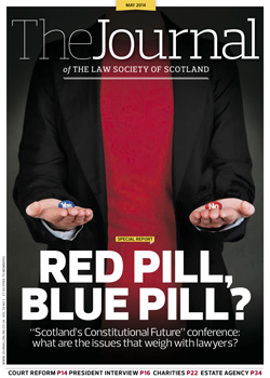Referendum – the rules of debate

In a little over four months, Scotland faces a momentous decision that, whatever the outcome, will have an impact on our constitutional settlement, our institutions and public policy. As a prominent player in that arena, the charity and voluntary sector has been watching the debate and considering how far to play a part.
That’s why the Scottish Charity Regulator – along with other bodies such as the Carnegie Trust and ACOSVO (Association of Chief Officers of Scottish Voluntary Organisations) – produced guidance last year for charities, to help them keep within the requirements of charity law. Our guidance, published in July 2013, sets out the legal principles, explains the issues that charities must consider, and provides examples to illustrate some situations they may encounter.
Essentially, as regulator we have confirmed that it is appropriate for some charities to make their voices heard during the referendum process. Charities play an important part in our society, and campaigning for or against a change in policy or legislation is a legitimate way for many of them toachieve what they were set up for, which is to further their charitable purposes.
However, it is important that, in doing so, charities do ensure that they comply with the requirements of charity law.
In general, a charity may take part in the referendum process if it can show that it is advancing its charitable purposes; its governing document does not prohibit such activity; it is not advancing a political party; and the trustees are acting in the charity’s interests with care and diligence.
Some charities have already taken a view on whether and how they will respond to the referendum campaign and its potential outcomes – notable examples including the Scottish Refugee Council, Diabetes UK and Scottish Environment LINK, which feature in a suite of webcasts on our website.
In support of our guidance, these real-life examples have proved useful for illustrating the issues each faced and how they approached them. Together with the guidance, these have been viewed more than 4,000 times since publication.
For us as regulator, it is important charities can demonstrate that they have considered the potential impact of the referendum on themselves and their beneficiaries, in a strategic manner.
Even if they ultimately decide not to express a view, it is a sensible approach to this important issue and demonstrates good governance.
The legal profession therefore has a key role – if your charity clients have not already considered the potential implications of the referendum’s outcome, it is important that they do so as soon as possible.
We would welcome your support in highlighting our guidance at www.oscr.org.uk
In addition to our own guidance, there is other information and support available to the sector on this issue (see panel below). Particularly helpful is the “Ten Steps” guidance published by the Carnegie UK Trust and ACOSVO, which sets out clearly how charity trustees and chief executives could implement a process that demonstrates their consideration of the issues they face and arrive at an appropriate view.
Whatever the referendum outcome, charities, along with other institutions in Scotland, face a potential time of change and it is therefore only right that the matter is properly considered, debated and agreed – just as in any issue of governance.
Useful links
- The Carnegie Trust and ACOSVO 10 steps, mentioned in the article
- OSCR’s own guidance
- In terms of sector support, SCVO
- Third Sector Interfaces through Voluntary Action Scotland
In this issue
- Immigration: where British nationals lose out
- Family actions: be prepared
- The psychology of post-adoption contact
- Attack vectors into the law: Heartbleed
- When family farming partnerships go wrong
- Reading for pleasure
- Opinion: Gillian Mawdsley
- Book reviews
- Profile
- President's column
- The results are in
- The best medicine?
- LBTT: key points for solicitors
- Courts: why the reforms add up
- Unfinished business
- The voice of technology
- Capacity: a growing issue
- Charities and the rise of social enterprises
- Referendum – the rules of debate
- Rewriting the rules
- Family leave – bedevilled by detail
- Strictly confidential?
- Budget: your flexible friend
- Scottish Solicitors' Discipline Tribunal
- Food for thought
- The consumer protection challenge
- People on the move
- Ask us another
- Healthy discord
- Claims, trends and targets
- Ask Ash
- Law reform roundup
- Cost of Time 2014: survey now open






